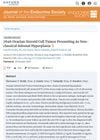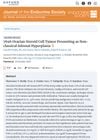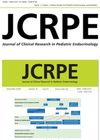 63 citations,
March 2011 in “Clinical Endocrinology”
63 citations,
March 2011 in “Clinical Endocrinology” Evaluate postmenopausal women with high androgen levels using medical history, physical exams, lab tests, and imaging to manage health risks.
 49 citations,
September 2012 in “The Journal of clinical endocrinology and metabolism/Journal of clinical endocrinology & metabolism”
49 citations,
September 2012 in “The Journal of clinical endocrinology and metabolism/Journal of clinical endocrinology & metabolism” The document concludes with guidance for doctors on diagnosing and treating hirsutism effectively and safely.
 38 citations,
January 2014 in “International Journal of Endocrinology”
38 citations,
January 2014 in “International Journal of Endocrinology” Adrenal disorders can cause lasting brain and behavior issues in children.
 18 citations,
June 2010 in “Current medicinal chemistry”
18 citations,
June 2010 in “Current medicinal chemistry” Treating hirsutism in women often requires a mix of medications and cosmetic methods for best results.
 6 citations,
April 2018 in “Obstetrics, gynaecology and reproductive medicine”
6 citations,
April 2018 in “Obstetrics, gynaecology and reproductive medicine” Most women with hirsutism have it because of PCOS, and they need long-term treatment including medication and hair removal to improve their condition.
 2 citations,
January 2013 in “Elsevier eBooks”
2 citations,
January 2013 in “Elsevier eBooks” The chapter explains the causes of excessive hair growth and masculinization in women and how to measure hormone levels related to these conditions.
 May 2010 in “Current Women's Health Reviews”
May 2010 in “Current Women's Health Reviews” The document concludes that early diagnosis and treatment of PCOS in teenagers is important for managing symptoms and preventing long-term health problems.
 April 2008 in “Obstetrics, gynaecology and reproductive medicine”
April 2008 in “Obstetrics, gynaecology and reproductive medicine” Hirsutism is often caused by high male hormone levels and can be treated with lifestyle changes and medications.
48 citations,
January 2005 in “Treatments in Endocrinology” 26 citations,
July 2012 in “Journal of family planning and reproductive health care” The document says that hirsutism in women usually needs hair removal and hormone treatment to manage symptoms and improve well-being.
 April 2023 in “Clinical Chemistry and Laboratory Medicine”
April 2023 in “Clinical Chemistry and Laboratory Medicine” The document concludes that inflammation markers can be used in diabetes, vitamin D3 affects immune pathways, hyperthyroidism changes hormone levels, androgen levels help diagnose Adrenocortical Carcinoma, erectile dysfunction is linked to diabetes, hypogonadism is common in HIV-infected males, and hormones can be biomarkers for various conditions.
 July 2021 in “Advances in laboratory medicine”
July 2021 in “Advances in laboratory medicine” Diagnosing sex development disorders requires combining medical history, physical exams, imaging, lab tests, and genetic data.
 14 citations,
January 2013 in “Hormone and Metabolic Research”
14 citations,
January 2013 in “Hormone and Metabolic Research” The severity of symptoms in nonclassical congenital adrenal hyperplasia is not determined by CYP21A2 gene variations.
 31 citations,
November 2014 in “Journal of Endocrinological Investigation”
31 citations,
November 2014 in “Journal of Endocrinological Investigation” Women with androgen excess, especially those with PCOS, have a much higher risk of heart disease and stroke.
 29 citations,
March 2019 in “British Journal of Dermatology”
29 citations,
March 2019 in “British Journal of Dermatology” Acne is significantly influenced by genetics, and understanding its genetic basis could lead to better, targeted treatments.
 July 2017 in “Contemporary Endocrinology”
July 2017 in “Contemporary Endocrinology” The document concludes that patient outcomes for Congenital Adrenal Hyperplasia are often not ideal because of poor management and a need for better diagnosis and treatment methods.
 August 2022 in “IntechOpen eBooks”
August 2022 in “IntechOpen eBooks” Congenital Adrenal Hyperplasia is a rare inherited disease causing hormone imbalances, affecting growth, fertility, and heart health, diagnosed through blood tests and treated with medication and lifestyle changes.
 49 citations,
January 2010 in “International Journal of Pediatric Endocrinology”
49 citations,
January 2010 in “International Journal of Pediatric Endocrinology” The document concludes that Nonclassic Congenital Adrenal Hyperplasia requires personalized treatment plans to manage symptoms and fertility, with glucocorticoids being a common therapy.
5 citations,
March 2013 in “BMJ case reports” Gastric bypass surgery improved a woman's hormonal disorder without the need for medication.
 1 citations,
February 2017 in “Journal of gynecology and womens health”
1 citations,
February 2017 in “Journal of gynecology and womens health” The document concluded that more research is needed to understand how estrogen affects the enzyme involved in hirsutism development.
7 citations,
April 1992 in “Journal of steroid biochemistry and molecular biology/The Journal of steroid biochemistry and molecular biology” Women with non-classical congenital adrenal hyperplasia have higher levels of certain steroids, which can be reduced by treatment.
 October 2024 in “Journal of the Endocrine Society”
October 2024 in “Journal of the Endocrine Society” Ovarian steroid cell tumors can mimic adrenal hyperplasia, and surgery can normalize hormone levels.
 October 2024 in “Journal of the Endocrine Society”
October 2024 in “Journal of the Endocrine Society” Early detection of ovarian steroid cell tumors is crucial to prevent lasting symptoms.
 October 2007 in “Clinical Biochemistry”
October 2007 in “Clinical Biochemistry” New genotype linked to non-classical congenital adrenal hyperplasia found in Italian siblings.
 December 2024 in “Journal of Clinical Research in Pediatric Endocrinology”
December 2024 in “Journal of Clinical Research in Pediatric Endocrinology” 21-hydroxylase deficiency causes hormone imbalances leading to various symptoms, and diagnosis involves clinical and genetic tests.
46 citations,
October 2012 in “Seminars in reproductive medicine” Genetic defects in androgen production are linked to male developmental disorders and are improving treatment understanding.
 48 citations,
February 2013 in “Molecular and Cellular Endocrinology”
48 citations,
February 2013 in “Molecular and Cellular Endocrinology” The protein StAR is found in 17 different organs and can affect hair loss and brain functions, but its full role is not yet fully understood.
5 citations,
September 2012 in “BMJ case reports” Ashwagandha may improve hormone levels and reduce hair loss in non-classical adrenal hyperplasia.
 32 citations,
June 2019 in “Frontiers in Endocrinology”
32 citations,
June 2019 in “Frontiers in Endocrinology” Polycystic Ovary Syndrome (PCOS) is common in women with conditions like anovulation, hirsutism, hair loss, and type 2 diabetes, and it can lead to health risks like heart disease, obesity, insulin resistance, and depression. Non-Classic Congenital Adrenal Hyperplasia (NC-CAH) is also discussed.
1 citations,
May 2013 in “Hair transplant forum international” Non-classical 21 hydroxylase deficiency is an underdiagnosed cause of female hair loss and polycystic ovarian syndrome.























